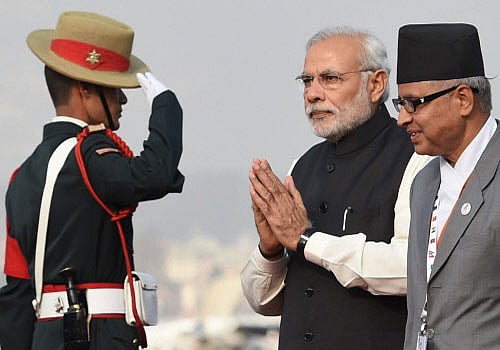
India on Tuesday highlighted the latest terror attack in Afghanistan to drive home the point that terrorism posed the “biggest challenge” for south Asia.
A day before Prime Minister Narendra Modi is scheduled to address the 18th summit of the South Asian Association for Regional Cooperation (Saarc) in Kathmandu, External Affairs Minister Sushma Swaraj raised New Delhi’s pitch on terrorism and referred to the recent attack that killed at least 57 and injured several during a volleyball match in Afghanistan.
“Let me begin by conveying my condolences to the government and people of Afghanistan for the terrible tragedy they have faced,” Swaraj said on Tuesday, while addressing her counterparts from Saarc nations who met here ahead of the summit.
“This cowardly act, of killing and maiming people watching a volleyball match, has shown once again that terrorism is the biggest challenge our region faces today, and requires a collective response,” she said.
Sushma’s remark was apparently part of New Delhi’s bid to renew the Saarc’s focus on terrorism, particularly on its epicentre in Pakistan.
A suicide attack killed 57 people at Paktika in eastern Afghanistan on Sunday.
Afghanistan’s National Directorate of Security blamed the Haqqani Network, an ally of Pak-based Taliban, for the attack.
The Haqqani Network earlier carried out several attacks on Indian interests in Afghanistan. The US earlier blamed Inter Services Intelligence of Pakistan for using Haqqani Network to target Indian and American facilities and personnel in Afghanistan.
Modi is also likely to make a strong pitch for more effective action by the eight-nation bloc to combat terrorism in south Asia. Without directly referring to anti-India terror networks operating out of Pakistan, he is expected to call for immediate action to dismantle transnational terrorist networks in south Asia region.
Though the Saarc Regional Convention on Suppression of Terrorism came into effect in 1988, it failed to boost cooperation among the members to combat the menace.
Subsequently, the Saarc Convention on Mutual Assistance in Criminal Matters was signed in 2008. Though India, Bangladesh and Sri Lanka are among the countries that ratified the convention, Pakistan is yet to ratify.

